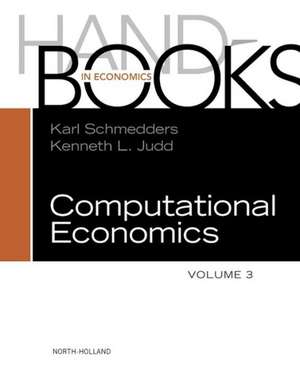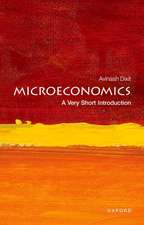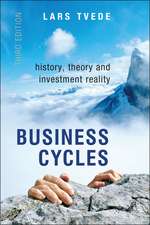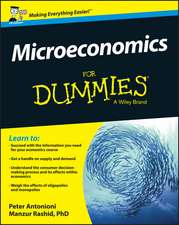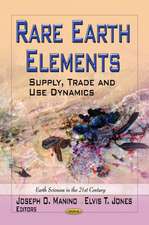Handbook of Computational Economics: Handbook of Computational Economics, cartea 3
Editat de Karl Schmedders, Kenneth L. Judden Limba Engleză Hardback – 15 dec 2013
Much more can be done to expand the value of computational modeling in economics. In conjunction with volume one (1996) and volume two (2006), this volume offers a remarkable picture of the recent development of economics as a science as well as an exciting preview of its future potential.
- Samples different styles and approaches, reflecting the breadth of computational economics as practiced today
- Focuses on problems with few well-developed solutions in the literature of other disciplines
- Emphasizes the potential for increasing the value of computational modeling in economics
Preț: 628.78 lei
Preț vechi: 690.97 lei
-9% Nou
Puncte Express: 943
Preț estimativ în valută:
120.32€ • 125.88$ • 99.95£
120.32€ • 125.88$ • 99.95£
Carte tipărită la comandă
Livrare economică 27 martie-10 aprilie
Preluare comenzi: 021 569.72.76
Specificații
ISBN-13: 9780444529800
ISBN-10: 0444529802
Pagini: 688
Dimensiuni: 191 x 235 x 36 mm
Greutate: 1.59 kg
Editura: ELSEVIER SCIENCE
Seria Handbook of Computational Economics
ISBN-10: 0444529802
Pagini: 688
Dimensiuni: 191 x 235 x 36 mm
Greutate: 1.59 kg
Editura: ELSEVIER SCIENCE
Seria Handbook of Computational Economics
Cuprins
- Learning About Learning in Dynamic Economic Models - David A. Kendrick, Hans M. Amman, & Marco P. Tucci
- On the Numerical Solution of Equilibria in Auction Models with Asymmetries within the Private-Values Paradigm - Timothy P. Hubbard & Harry Paarsch
- Analyzing Fiscal Policies in a Heterogeneous-Agent Overlapping Generations Economy - Shinichi Nishiyama & Kent Smetters
- On Formulating and Solving Portfolio Decision and Asset Pricing Problems - Yu Chen, Thomas F. Cosimano, & Alex A. Himonas
- Computational Methods for Derivatives with Early Exercise Features - Carl Chiarella, Boda Kang, Gunter Meyer, & Andrew Ziogas
- Solving and Simulating Models with Heterogeneous Agents and Aggregate Uncertainty - Yann Algan, Olivier Allais, Wouter J. den Haan, & Pontius Rendahl
- Numerical Methods for Large Scale Dynamic Economic Models - Lilia Maliar & Serguei Maliar
- Advances in Numerical Dynamic Programming and New Applications - Yongyang Cai & Kenneth L. Judd
- Accuracy of Numerical Errors - Adrian Peralta-Alva & Manuel S. Santos
- GPU Computing in Economics - Eric Aldrich
- Computing All Solutions to Polynomial Equations in Economics - Felix Kubler, Philipp Renner, & Karl Schmedders
Recenzii
"...indispensable reference works which belong in every professional collection, and form ideal supplementary reading for graduate economics students on advanced courses." --Zentralblatt MATH, Sep-14
"In this volume the best experts show the breadth and depth of the state of the art of computational tools ready to accurately compute solutions and equilibria with a wide range of applications and models in macroeconomics and finance." --Cars Hommes, University of Amsterdam
"Volume 3 of the Handbook of Computational Economics, which reviews the development of computational algorithms yielding approximate equilibrium solutions for analytically modeled dynamic economic systems, provides a useful complement to Volume 2, which introduced agent-based computational economic (ACE) modeling tools for the computational study of economic processes as open-ended dynamic systems of interacting agents. Particular attention is focused on dynamic stochastic models that generalize traditional assumptions regarding agent heterogeneity, preference specifications, decision horizons, state-space characteristics, market imperfections, idiosyncratic risks, and aggregate uncertainty. Building on earlier simulation techniques, the computational algorithms incorporate recent advances in projection methods and perturbation techniques." --Leigh Tesfatsion, Iowa State University
"In this volume the best experts show the breadth and depth of the state of the art of computational tools ready to accurately compute solutions and equilibria with a wide range of applications and models in macroeconomics and finance." --Cars Hommes, University of Amsterdam
"Volume 3 of the Handbook of Computational Economics, which reviews the development of computational algorithms yielding approximate equilibrium solutions for analytically modeled dynamic economic systems, provides a useful complement to Volume 2, which introduced agent-based computational economic (ACE) modeling tools for the computational study of economic processes as open-ended dynamic systems of interacting agents. Particular attention is focused on dynamic stochastic models that generalize traditional assumptions regarding agent heterogeneity, preference specifications, decision horizons, state-space characteristics, market imperfections, idiosyncratic risks, and aggregate uncertainty. Building on earlier simulation techniques, the computational algorithms incorporate recent advances in projection methods and perturbation techniques." --Leigh Tesfatsion, Iowa State University
